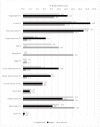Food Costs of Children and Adolescents Consuming Vegetarian, Vegan or Omnivore Diets: Results of the Cross-Sectional VeChi Youth Study
- PMID: 36235662
- PMCID: PMC9573339
- DOI: 10.3390/nu14194010
Food Costs of Children and Adolescents Consuming Vegetarian, Vegan or Omnivore Diets: Results of the Cross-Sectional VeChi Youth Study
Abstract
The aim was to analyse the total food costs and the impact of food groups on total food costs among vegetarian, vegan and omnivore children and adolescents in Germany. Based on three-day weighed dietary records of 6-18-year-old children and adolescents of the VeChi Youth Study, the total daily food costs and food group costs (both EUR/day, EUR/1000 kcal) of a vegetarian (n = 145 records), vegan (n = 110) and omnivore (n = 135) diet were calculated. Minimum retail prices of 1000 empirically selected foods reported in the dietary records were linked to individual food intakes. The group differences were analysed using ANCOVA or Kruskal-Wallis tests. Vegans had the highest energy adjusted total food costs at 2.98 EUR/1000 kcal, vegetarians the lowest at 2.52 EUR/1000 kcal. Omnivores also had significantly higher costs than vegetarians with 2.83 EUR/1000 kcal/1000 kcal (p = 0.01), but the total costs did not differ significantly between omnivores and vegans (EUR/d and EUR/1000 kcal). Compared to vegetarians, vegans had significantly higher expenditures (EUR/day) on fruit (p = 0.0003), vegetables (p = 0.006), dairy alternatives (p = 0.0003) and legumes/nuts/seeds (p = 0.0003). Expenditure on starchy foods was significantly higher in the vegetarian or vegan than in the omnivore diet (p = 0.0003). Omnivores spent a quarter of their total food costs on animal source foods (25%), which is equivalent to the sum of food costs for legumes/nuts/seeds, dairy alternatives and meat alternatives in vegans and additionally dairy in vegetarians. The VeChi Youth Study indicated that financial constraints are not necessarily a barrier to switching to a more plant-based diet.
Keywords: adolescents; children; food costs; omnivore diet; vegan diet; vegetarian diet.
Conflict of interest statement
E.H., A.L., S.W., A.M. and M.F. declare no conflicts of interest. M.K. is an unsalaried member of the Scientific Advisory Board of ProVeg Germany. U.A. and M.K. headed the VeChi Diet Study which was funded by the Erna-Graff-Stiftung für Tierschutz.
Figures
Similar articles
-
Food group intake of children and adolescents (6-18 years) on a vegetarian, vegan or omnivore diet: results of the VeChi Youth Study.Br J Nutr. 2022 Sep 14;128(5):851-862. doi: 10.1017/S0007114521003603. Epub 2021 Sep 13. Br J Nutr. 2022. PMID: 34511141
-
Dietary patterns among children and adolescents in Germany consuming vegetarian, vegan or omnivore diets: results of the VeChi Youth Study.Eur J Nutr. 2024 Dec;63(8):3161-3174. doi: 10.1007/s00394-024-03497-6. Epub 2024 Sep 23. Eur J Nutr. 2024. PMID: 39311899 Free PMC article.
-
Selenium, zinc, and copper intake and status of vegetarian, vegan, and omnivore children and adolescents: results of the VeChi youth study.Eur J Nutr. 2025 Jul 22;64(5):247. doi: 10.1007/s00394-025-03761-3. Eur J Nutr. 2025. PMID: 40694126 Free PMC article.
-
Fracture Risk in Vegetarians and Vegans: the Role of Diet and Metabolic Factors.Curr Osteoporos Rep. 2022 Dec;20(6):442-452. doi: 10.1007/s11914-022-00754-7. Epub 2022 Sep 21. Curr Osteoporos Rep. 2022. PMID: 36129610 Review.
-
Calcium intake in vegan and vegetarian diets: A systematic review and Meta-analysis.Crit Rev Food Sci Nutr. 2023;63(31):10659-10677. doi: 10.1080/10408398.2022.2084027. Epub 2022 Jun 6. Crit Rev Food Sci Nutr. 2023. PMID: 38054787
Cited by
-
Difference in Motives and Basic Health Behavior of 8799 Children and Adolescents Aged 10-19 Years Following a Vegan, Vegetarian, or Omnivorous Diet.Curr Dev Nutr. 2025 Jun 23;9(7):107498. doi: 10.1016/j.cdnut.2025.107498. eCollection 2025 Jul. Curr Dev Nutr. 2025. PMID: 40718430 Free PMC article.
-
The Biological Value of Proteins for Pediatric Growth and Development: A Narrative Review.Nutrients. 2025 Jul 4;17(13):2221. doi: 10.3390/nu17132221. Nutrients. 2025. PMID: 40647326 Free PMC article. Review.
-
Vegan Diets for Children: A Narrative Review of Position Papers Published by Relevant Associations.Nutrients. 2023 Nov 7;15(22):4715. doi: 10.3390/nu15224715. Nutrients. 2023. PMID: 38004109 Free PMC article. Review.
References
-
- Von Koerber K., Waldenmaier J., Cartsburg M. Nutrition and the guiding principle of sustainability: Global challenges and problem- solving approaches on a national and international. Ernähr. Umschau. 2020;67:32–41. doi: 10.4455/eu.2020.011. - DOI
-
- Willett W., Rockström J., Loken B., Springmann M., Lang T., Vermeulen S., Garnett T., Tilman D., DeClerck F., Wood A., et al. Food in the Anthropocene: The EAT–Lancet Commission on healthy diets from sustainable food systems. Lancet. 2019;393:447–492. doi: 10.1016/S0140-6736(18)31788-4. - DOI - PubMed
MeSH terms
Grants and funding
LinkOut - more resources
Full Text Sources
Medical


